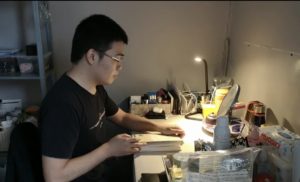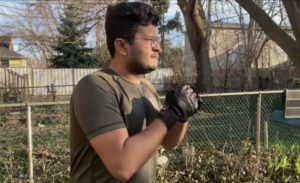How international students are coping with staying home during COVID-19 outbreak
In general, most people plan their holidays around special events or occasions. But this year is clearly different, as COVID-19 has left the world in a state of paralysis. Countries have blocked borders, flights have been restricted and whether you intended to travel or use your vacation time from work, it’s no longer possible.
One of the segments of the population most impacted is international students studying in Canada, because they can’t back to their home countries. In the face of the outbreak, they can only isolate themselves in rented houses. Wuyue Tang is one of them.
Tang, who is about to graduate from the University of Windsor, has no time to go home because of his busy studies and a part-time job. It has been nearly two years since he last went home to China.
“I have to say this is a tough time during my life,” said Tang. “I felt very depressed. I was going to spend this month with my family, but my flight was just cancelled. And I can’t work part-time now because all the restaurants are closed.”
Because Tang’s parents are in China, they experienced the outbreak before many Canadians, so they can fully understand how scary it is. Worried about him, Tang’s parents tried mailing him some masks from China.
“I think I should think of something positive,” said Tang. “I’ve got some food in reserve and now it’s enough for two weeks, and then I’ve got a mask to protect me from the virus, and I think I’m luckier than most people.”
Most people would feel frustrated or bored in the current situation, but Tang believes we should just relax and do something slow and pleasant since we can’t do much in public right now.
“I think I was used to cooking in the microwave that I didn’t have time to prepare anything new,” Tang said. “But now that I’m stuck at home, I realize it’s a great opportunity to improve my cooking. I began to enjoy preparing food for me and my girlfriend. Of course, I’m starting to do some reading, just read the books. I have never (had time) to do so.”
Tang is about to graduate, but the situation has made it difficult for him to find a job. He believes even in the face of difficulties you need a good mentality to be prepared so that you can seize the opportunity when it comes.
“All I can think about now is something positive, like getting my resume ready and hoping I’ll be ready to find a job when the epidemic is over. I’m sure we can all get through this,” he said.
Jeel Mehta is an International Business Management student at St. Clair College. He had planned to travel to Colombia, but now his travel and study have been affected.
“It affected my studies. We’re all online now, online exams,” said Mehta. “There are some technical issues here and we can’t do it completely. It is very different from having a class face-to-face. ”
Mehta doesn’t think it’s hard to stay at home. Instead, he thinks he has more free time now.
 “I’m a guy, so I don’t care too much,” said Mehta. “I was going to work and I couldn’t play games, but now I have time to play video games with my friends, watch movies, drink beer, so I’m fine.”
“I’m a guy, so I don’t care too much,” said Mehta. “I was going to work and I couldn’t play games, but now I have time to play video games with my friends, watch movies, drink beer, so I’m fine.”
Of course, Mehta has a positive side to his life at home. In addition to studying hard and completing school tasks, he also does some exercise in his yard, such as boxing and jogging.
“It’s not a good thing, but for me, I have time to do something I like, and I’m happy.”
Alex Wu, a teacher in the international office at St. Clair College, is convinced that if each of us do our job and keep a physical distance, we can overcome the epidemic.
“Please remember, this is very important!” said Wu. “Please stay home, wash your hands often, and if you have to go out, keep a social distance! The college will do our best to provide help for everyone, from life to study, to do our best to do what we can.”
According to Wu, if students have symptoms, they can either go online and do their own assessments or notify the government, school or international office. He suggests students report symptoms early to get the most timely help.


